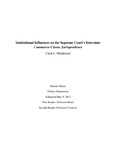| dc.rights.license | In Copyright | en_US |
| dc.creator | Hildabrand, Clark Lassiter | |
| dc.date.accessioned | 2013-05-21T13:27:28Z | |
| dc.date.available | 2013-05-21T13:27:28Z | |
| dc.date.created | 2013 | |
| dc.identifier | WLURG38_Hildabrand_POL_2013 | |
| dc.identifier.uri | http://hdl.handle.net/11021/23903 | |
| dc.description | Thesis; [ACCESS TO FULL-TEXT IS RESTRICTED. REQUESTS WILL BE SUBMITTED TO THE AUTHOR.] | en_US |
| dc.description | Clark Lassiter Hildabrand is a member of the Class of 2013 of Washington and Lee University. | en_US |
| dc.description.abstract | To address these questions regarding the impact of institutional factors on the Supreme Court in NFIB v. Sebelius, this thesis will first examine two competing academic theories on how judges decide cases: the attitudinal and strategic views. While the attitudinal view claims justices only rule based on their deeply held political beliefs and legal philosophies, the strategic view factors in the influence of institutional factors such as the Supreme Court's relationship with Congress, the presidency, and the states. After briefly considering and contrasting these competing theories, this thesis will apply them to several cases significant in the development of Interstate Commerce Clause jurisprudence. The first case-study delves into precedents set by the Marshall Court, such as Gibbons v. Ogden (1824), Brown v. Maryland (1827), and Willson v. Black-Bird Creek Marsh Company (1829), to explore the Federalist Chief Justice's struggle to empower the national government while at the same time respecting the dominant position of the states. This struggle between the states and federal government continued with the development of the Dormant Commerce Clause doctrine in the Passenger Cases (1849) and Cooley v. Board of Wardens (1852) as individual justices seemed to modify their opinions enough to avoid a constitutional struggle over slavery and other issues. The next major shift in Interstate Commerce Clause jurisprudence occurred with the defection of a different Justice Roberts in National Labor Relations Board (NLRB) v. Jones & Laughlin Steel Corporation (1937) which sharply contrasted with the majority opinion he signed onto just a year previously in Carter v. Carter Coal Company (1936). Franklin Delano Roosevelt's landslide electoral victory in 1936 and pressure on the Supreme Court resulted in an expansive interpretation of the Interstate Commerce Clause which was not challenged until the Rehnquist Court. As a final historic case-study, this thesis attempts to explain how attitudinal and institutional factors played a role both in the Rehnquist Court's initial limitation of federal power and Justices Kennedy and Scalia's qualified support of the use of the Commerce Clause in Gonzales v. Raich. This theoretical and historic approach establishes the necessary and vital role institutional factors play in Interstate Commerce Clause cases and elucidates Chief Justice Roberts' opinion in NFIB v. Sebelius and his vision for the future of the Court. Although institutional factors likely contributed to his unwillingness to sacrifice the Supreme Court's reputation for political independence for the short-term victory of overturning a major success of President Obama and a Democratic Congress, the Chief Justice's controlling opinion indicates his long-term commitment to curbing, at least slightly, the expansion of federal power through the Interstate Commerce Clause. | en_US |
| dc.description.statementofresponsibility | Clark L. Hildabrand | |
| dc.format.extent | 80 pages | en_US |
| dc.language.iso | en_US | en_US |
| dc.rights | This material is made available for use in research, teaching, and private study, pursuant to U.S. Copyright law. The user assumes full responsibility for any use of the materials, including but not limited to, infringement of copyright and publication rights of reproduced materials. Any materials used should be fully credited with the source. | en_US |
| dc.rights.uri | http://rightsstatements.org/vocab/InC/1.0/ | en_US |
| dc.subject.other | Washington and Lee University -- Honors in Politics | en_US |
| dc.title | Institutional Influences on the Supreme Court's Interstate Commerce Clause Jurisprudence (thesis) | en_US |
| dc.type | Text | en_US |
| dcterms.isPartOf | RG38 - Student Papers | |
| dc.rights.holder | Hildabrand, Clark Lassiter | |
| dc.subject.fast | Judge-made law | en_US |
| dc.subject.fast | Constitutional law | en_US |
| dc.subject.fast | United States. Supreme Court | en_US |
| dc.subject.fast | Interstate commerce -- Law and legislation | en_US |
| local.department | Politics | en_US |
| local.scholarshiptype | Honors Thesis | en_US |
